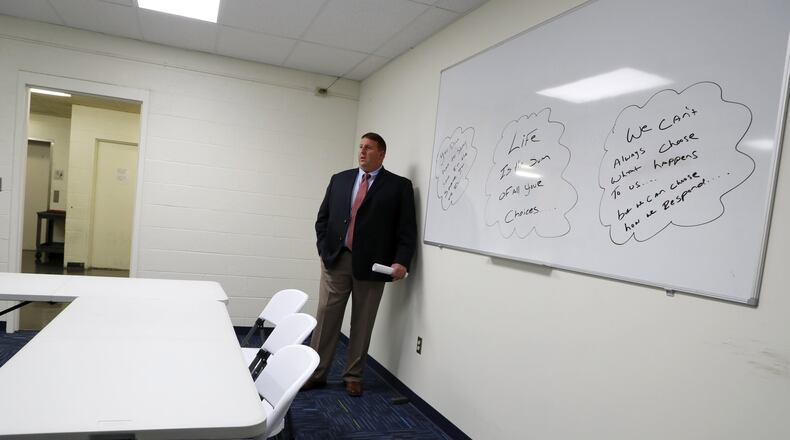RELATED: Clark County leaders: Drug ‘emergency’ first step, more action needed
“If we can start working on some of the skills that they’re lacking while they’re incarcerated that makes it all the better once they get out,” said Deontrae Ellis, program coordinator with McKinley Hall.
It’s an intensive outpatient program, Ellis said. It was able to expand after the jail converted its employee gym into two classroom spaces. Inmates meet for nine hours a week in some capacity, Ellis said. The program includes addiction education classes, as well as group and individual counseling.
“It’s needed in Clark County because we have a serious opiate problem,” he said. “It’s just another way to combat it.”
In Clark County, a record 97 people have died of drug overdoses so far this year and local law enforcement have responded to more than 1,000 drug overdoses, local leaders said. Responding to those overdoses and other drug-related calls is time-consuming and ties up resources, local law enforcement leaders have told the Springfield News-Sun.
McKinley Hall now also has a case manager and therapist with offices within the jail.
READ MORE: New program seeks to reach Clark County overdose patients, save lives
The jail wanted to do more to help inmates prepare for release, Jail Administrator Lt. Michael Young said, so he and Clark County Sheriff Deborah Burchett were on board with the plan to expand treatment. Many of the inmates in jail are there on charges related to drugs.
“We realized that we’re not doing enough,” Young said. “… These are all members of our community. So when they’re incarcerated, what are we doing to prepare them to be better members of the community?”
The goal is to get people on a path to recovery while they’re incarcerated, Young said, that they can continue after they’re released.
“Then even if you get out and you stumble or you hit the addiction again, hopefully there’s a better plan in place to get you kind of reorganized,” he said.
Since the creation of McKinley Hall’s Criminal Justice Program, Ellis said 271 clients have received treatment and about 110 of them haven’t had any new arrests in the past year. That’s a trend Ellis hopes will continue.
“Over the last three to five years, we’ve been trying to tackle this opiate problem any and every way that we can,” he said. “And providing services to our residents while they’re actually incarcerated is just another step in the right direction.”
ABOUT THIS SERIES
The Springfield News-Sun has written extensively about opioid and heroin problems in Clark County in the past five years, including stories about multiple overdoses in one weekend and efforts to expand treatment options. This year, the News-Sun will take a deep dive into the community’s drug epidemic and what local leaders are doing to solve the problem.
About the Author
